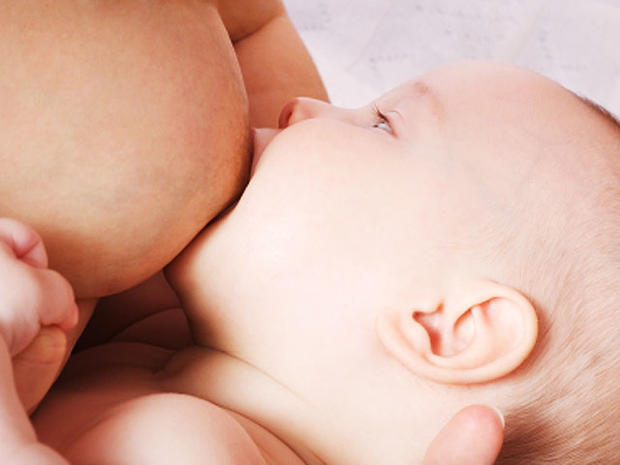Breast-Feeding Advice Wrong? What Should Moms Do?
(CBS) It's long been conventional wisdom that breast is best when it comes to feeding babies, but a controversial new study out of Britain suggests that newborns may benefit from a little variety in their diets, especially from the fourth month on.
Researchers led by Dr. Mary Fewtrell, a pediatrician at the UCL Institute of Child Health in London, argue that feeding babies only breast milk for the first six months of their lives leaves them at risk for iron-deficiency anemia and possibly celiac disease and food allergies.
They also fret that the first few months are an important window to introduce new tastes, including the bitter flavor of leafy greens that so many kids despise, but are so vital to our health.
But many experts aren't so quick to jump aboard the new research.
"Most of the time, research is formulated by baby food and formula companies who are anxious to get their customers back," says Dr. Ruth Lawrence, a professor of pediatrics at the University of Rochester Medical Center and author of "Breastfeeding: A Guide for the Medical Profession."
In fact, "three of the four authors acknowledged having consulted or received research funding within the past three years from companies that manufacture infant formulas and baby foods," according to ABC News.
The study authors say their conclusions are based on a review of observational studies, which can be less reliable than other kinds of research. But, the researchers caution, so is much of the conventional wisdom about breast-feeding.
The researchers' advice is only for wealthy nations. They admit that, in the developing world, where access to quality food and clean water is inconsistent, breast-feeding exclusively is still the better bet.
Still, their guidance has raised eyebrows. The World Health Organization has long advocated for feeding babies exclusively with breast milk for the first six months of life. Research from 2000 found that strategy led to fewer infections and didn't create growth problems. Most European countries and America officially advocate that view.
But CBS News medical correspondent Dr. Jen Ashton says the real issue in America isn't whether to breast-feed exclusively - only 13 percent of women do that for six months - but whether to breast feed at all. According to the government data, only 43 percent of mothers are breast-feeding by the six month mark.
"Probably the most important hitting at six months is that we continue to provide breast milk even though mom might be adding solids, says Dr. Lawrence.
She cautions against replacing breast milk with formula. "Bovine protein [cow's milk] is the number one allergen," she says. "We don't want to get swept up providing bovine formula in place of breast milk."
The study was published in the British Medical Journal.
WHAT DO YOU THINK?
Should mothers breast feed exclusively at 6 months and beyond or add other foods?
